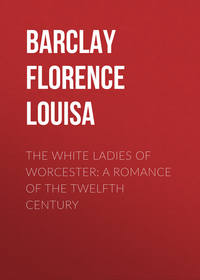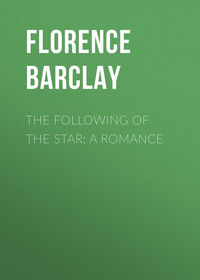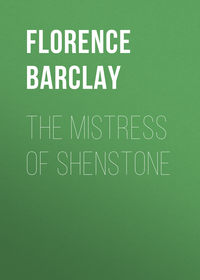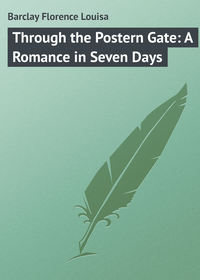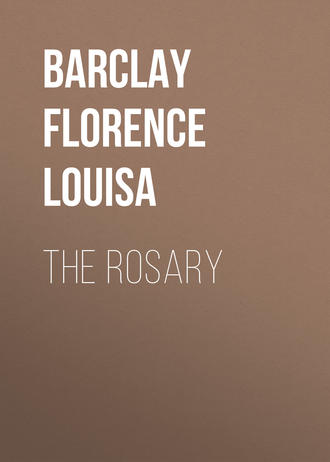 полная версия
полная версияThe Rosary
The night breeze stirred his thick dark hair, and his eyes, as he raised them, shone in the starlight.
And Jane, almost asleep, was roused by the tapping of her blind against the casement, and murmured "Anything you wish, Garth, just tell me, and I will do it." Then awakening suddenly to the consciousness of what she had said, she sat up in the darkness and scolded herself furiously. "Oh, you middle-aged donkey! You call yourself staid and sensible, and a little flattery from a boy of whom you are fond turns your head completely. Come to your senses at once; or leave Overdene by the first train in the morning."
CHAPTER VIII
ADDED PEARLS
The days which followed were golden days to Jane. There was nothing to spoil the enjoyment of a very new and strangely sweet experience.
Garth's manner the next morning held none of the excitement or outward demonstration which had perplexed and troubled her the evening before. He was very quiet, and seemed to Jane older than she had ever known him. He had very few lapses into his seven-year-old mood, even with the duchess; and when someone chaffingly asked him whether he was practising the correct deportment of a soon-to-be-married man,
"Yes," said Garth quietly, "I am."
"Will she be at Shenstone?" inquired Ronald; for several of the duchess's party were due at Lady Ingleby's for the following week-end.
"Yes," said Garth, "she will."
"Oh, lor'!" cried Billy, dramatically. "Prithee, Benedict, are we to take this seriously?"
But Jane who, wrapped in the morning paper, sat near where Garth was standing, came out from behind it to look up at him and say, so that only he heard it "Oh, Dal, I am so glad! Did you make up your mind last night?"
"Yes," said Garth, turning so that he spoke to her alone, "last night."
"Did our talk in the afternoon have something to do with it?"
"No, nothing whatever."
"Was it THE ROSARY?"
He hesitated; then said, without looking at her: "The revelation of THE ROSARY? Yes."
To Jane his mood of excitement was now fully explained, and she could give herself up freely to the enjoyment of this new phase in their friendship, for the hours of music together were a very real delight. Garth was more of a musician than she had known, and she enjoyed his clean, masculine touch on the piano, unblurred by slur or pedal; more delicate than her own, where delicacy was required. What her voice was to him during those wonderful hours he did not express in words, for after that first evening he put a firm restraint upon his speech. Under the oaks he had made up his mind to wait a week before speaking, and he waited.
But the new and strangely sweet experience to Jane was that of being absolutely first to some one. In ways known only to himself and to her Garth made her feel this. There was nothing for any one else to notice, and yet she knew perfectly well that she never came into the room without his being instantly conscious that she was there; that she never left a room, without being at once missed by him. His attentions were so unobtrusive and tactful that no one else realised them. They called forth no chaff from friends and no "Hoity-toity! What now?" from the duchess. And yet his devotion seemed always surrounding her. For the first time in her life Jane was made to feel herself FIRST in the whole thought of another. It made him seem strangely her own. She took a pleasure and pride in all he said, and did, and was; and in the hours they spent together in the music-room she learned to know him and to understand that enthusiastic beauty-loving, irresponsible nature, as she had never understood it before.
The days were golden, and the parting at night was sweet, because it gave an added zest to the pleasure of meeting in the morning. And yet during these golden days the thought of love, in the ordinary sense of the word, never entered Jane's mind. Her ignorance in this matter arose, not so much from inexperience, as from too large an experience of the travesty of the real thing; an experience which hindered her from recognising love itself, now that love in its most ideal form was drawing near.
Jane had not come through a dozen seasons without receiving nearly a dozen proposals of marriage. An heiress, independent of parents and guardians, of good blood and lineage, a few proposals of a certain type were inevitable. Middle-aged men—becoming bald and grey; tired of racketing about town; with beautiful old country places and an unfortunate lack of the wherewithal to keep them up—proposed to the Honourable Jane Champion in a business-like way, and the Honourable Jane looked them up and down, and through and through, until they felt very cheap, and then quietly refused them, in an equally business-like way.
Two or three nice boys, whom she had pulled out of scrapes and set on their feet again after hopeless croppers, had thought, in a wave of maudlin gratitude, how good it would be for a fellow always to have her at hand to keep him straight and tell him what he ought to do, don't you know? and—er—well, yes—pay his debts, and be a sort of mother-who-doesn't scold kind of person to him; and had caught hold of her kind hand, and implored her to marry them. Jane had slapped them if they ventured to touch her, and recommended them not to be silly.
One solemn proposal she had had quite lately from the bachelor rector of a parish adjoining Overdene. He had often inflicted wearisome conversations upon her; and when he called, intending to put the momentous question, Jane, who was sitting at her writing-table in the Overdene drawing-room, did not see any occasion to move from it. If the rector became too prosy, she could surreptitiously finish a few notes. He sank into a deep arm-chair close to the writing-table, crossed his somewhat bandy legs one over the other, made the tips of his fingers meet with unctuous accuracy, and intoned the opening sentences of his proposition. Jane, sharpening pencils and sorting nibs, apparently only caught the drift of what he was saying, for when he had chanted the phrase, "Not alone from selfish motives, my dear Miss Champion; but for the good of my parish; for the welfare of my flock, for the advancement of the work of the church in our midst," Jane opened a despatch-box and drew out her cheque-book.
"I shall be delighted to subscribe, Mr. Bilberry," she said. "Is it for a font, a pulpit, new hymn-books, or what?"
"My dear lady," said the rector tremulously, "you misunderstand me. My desire is to lead you to the altar."
"Dear Mr. Bilberry," said Jane Champion, "that would be quite unnecessary. From any part of your church the fact that you need a new altar-cloth is absolutely patent to all comers. I will, with the greatest pleasure, give you a cheque for ten pounds towards it. I have attended your church rather often lately because I enjoy a long, quiet walk by myself through the woods. And now I am sure you would like to see my aunt before you go. She is in the aviary, feeding her foreign birds. If you go out by that window and pass along the terrace to your left, you will find the aviary and the duchess. I would suggest the advisability of not mentioning this conversation to my aunt. She does not approve of elaborate altar-cloths, and would scold us both, and insist on the money being spent in providing boots for the school children. No, please do not thank me. I am really glad of an opportunity of helping on your excellent work in this neighbourhood."
Jane wondered once or twice whether the cheque would be cashed. She would have liked to receive it back by post, torn in half; with a few wrathful lines of manly indignation. But when it returned to her in due course from her bankers, it was indorsed P. BILBERRY, in a neat scholarly hand, without even a dash of indignation beneath it; and she threw it into the waste-paper basket, with rather a bitter smile.
These were Jane's experiences of offers of marriage. She had never been loved for her own sake; she had never felt herself really first in the heart and life of another. And now, when the adoring love of a man's whole being was tenderly, cautiously beginning to surround and envelop her, she did not recognise the reason of her happiness or of his devotion. She considered him the avowed lover of another woman, with whose youth and loveliness she would not have dreamed of competing; and she regarded this closeness of intimacy between herself and Garth as a development of a friendship more beautiful than she had hitherto considered possible.
Thus matters stood when Tuesday arrived and the Overdene party broke up. Jane went to town to spend a couple of days with the Brands. Garth went straight to Shenstone, where he had been asked expressly to meet Miss Lister and her aunt, Mrs. Parker Bangs. Jane was due at Shenstone on Friday for the week-end.
CHAPTER IX
LADY INGLEBY'S HOUSE PARTY
As Jane took her seat and the train moved out of the London terminus she leaned back in her corner with a sigh of satisfaction. Somehow these days in town had seemed insufferably long. Jane reviewed them thoughtfully, and sought the reason. They had been filled with interests and engagements; and the very fact of being in town, as a rule, contented her. Why had she felt so restless and dissatisfied and lonely?
From force of habit she had just stopped at the railway book-stall for her usual pile of literature. Her friends always said Jane could not go even the shortest journey without at least half a dozen papers. But now they lay unheeded on the seat in front of her. Jane was considering her Tuesday, Wednesday, and Thursday, and wondering why they had merely been weary stepping-stones to Friday. And here was Friday at last, and once in the train en route for Shenstone, she began to feel happy and exhilarated. What had been the matter with these three days? Flower had been charming; Deryck, his own friendly, interesting self; little Dicky, delightful; and Baby Blossom, as sweet as only Baby Blossom could be. What was amiss?
"I know," said Jane. "Of course! Why did I not realise it before? I had too much music during those last days at Overdene; and SUCH music! I have been suffering from a surfeit of music, and the miss of it has given me this blank feeling of loneliness. No doubt we shall have plenty at Myra's, and Dal will be there to clamour for it if Myra fails to suggest it."
With a happy little smile of pleasurable anticipation, Jane took up the SPECTATOR, and was soon absorbed in an article on the South African problem.
Myra met her at the station, driving ponies tandem. A light cart was also there for the maid and baggage; and, without losing a moment, Jane and her hostess were off along the country lane at a brisk trot.
The fields and woods were an exquisite restful green in the afternoon sunshine. Wild roses clustered in the hedges. The last loads of hay were being carted in. There was an ecstasy in the songs of the birds and a transporting sense of sweetness about all the sights and scents of the country, such as Jane had never experienced so vividly before. She drew a deep breath and exclaimed, almost involuntarily: "Ah! it is good to be here!"
"You dear!" said Lady Ingleby, twirling her whip and nodding in gracious response to respectful salutes from the hay-field. "It is a comfort to have you! I always feel you are like the bass of a tune—something so solid and satisfactory and beneath one in case of a crisis. I hate crises. They are so tiring. As I say: Why can't things always go on as they are? They are as they were, and they were as they will be, if only people wouldn't bother. However, I am certain nothing could go far wrong when YOU are anywhere near."
Myra flicked the leader, who was inclined to "sugar," and they flew along between the high hedges, brushing lightly against overhanging masses of honeysuckle and wild clematis. Jane snatched a spray of the clematis, in passing. "'Traveller's joy,'" she said, with that same quiet smile of glad anticipation, and put the white blossom in her buttonhole.
"Well," continued Lady Ingleby, "my house party is going on quite satisfactorily. Oh, and, Jane, there seems no doubt about Dal. How pleased I shall be if it comes off under my wing! The American girl is simply exquisite, and so vivacious and charming. And Dal has quite given up being silly—not that I ever thought him silly, but I know YOU did—and is very quiet and pensive; really were it any one but he, one would almost say 'dull.' And they roam about together in the most approved fashion. I try to get the aunt to make all her remarks to me. I am so afraid of her putting Dal off. He is so fastidious. I have promised Billy anything, up to the half of my kingdom, if he will sit at the feet of Mrs. Parker Bangs and listen to her wisdom, answer her questions, and keep her away from Dal. Billy is being so abjectly devoted in his attentions to Mrs. Parker Bangs that I begin to have fears lest he intends asking me to kiss him; in which case I shall hand him over to you to chastise. You manage these boys so splendidly. I fully believe Dal will propose to Pauline Lister tonight. I can't imagine why he didn't last night. There was a most perfect moon, and they went on the lake. What more COULD Dal want?—a lake, and a moon, and that lovely girl! Billy took Mrs. Parker Bangs in a double canoe and nearly upset her through laughing so much at the things she said about having to sit flat on the bottom. But he paddled her off to the opposite side of the lake from Dal and her niece, which was all we wanted. Mrs. Parker Bangs asked me afterwards whether Billy is a widower. Now what do you suppose she meant by that?"
"I haven't the faintest idea," said Jane. "But I am delighted to hear about Dal and Miss Lister. She is just the girl for him, and she will soon adapt herself to his ways and needs. Besides, Dal MUST have flawless loveliness, and really he gets it there."
"He does indeed," said Myra. "You should have seen her last night, in white satin, with wild roses in her hair. I cannot imagine why Dal did not rave. But perhaps it is a good sign that he should take things more quietly. I suppose he is making up his mind."
"No," said Jane. "I believe he did that at Overdene. But it means a lot to him. He takes marriage very seriously. Whom have you at Shenstone?"
Lady Ingleby told off a list of names. Jane knew them all.
"Delightful!" she said. "Oh! how glad I am to be here! London has been so hot and so dull. I never thought it hot or dull before. I feel a renegade. Ah! there is the lovely little church! I want to hear the new organ. I was glad your nice parson remembered me and let me have a share in it. Has it two manuals or three?"
"Half a dozen I think," said Lady Ingleby, "and you work them up and down with your feet. But I judged it wiser to leave them alone when I played for the children's service one Sunday. You never know quite what will happen if you touch those mechanical affairs."
"Don't you mean the composition pedals?" suggested Jane.
"I dare say I do," said Myra placidly. "Those things underneath, like foot-rests, which startle you horribly if you accidentally kick them."
Jane smiled at the thought of how Garth would throw back his head and shout, if she told him of this conversation. Lady Ingleby's musical remarks always amused her friends.
They passed the village church on the green, ivy-clad, picturesque, and, half a minute later, swerved in at the park gates. Myra saw Jane glance at the gate-post they had just shaved, and laughed. "A miss is as good as a mile," she said, as they dashed up the long drive between the elms, "as I told dear mamma, when she expostulated wrathfully with me for what she called my 'furious driving' the other day. By the way, Jane, dear mamma has been quite CORDIAL lately. By the time I am seventy and she is ninety-eight I think she will begin to be almost fond of me. Here we are. Do notice Lawson. He is new, and such a nice man. He sings so well, and plays the concertina a little, and teaches in the Sunday-school, and speaks really quite excellently at temperance meetings. He is extremely fond of mowing the lawns, and my maid tells me he is studying French with her. The only thing he seems really incapable of being, is an efficient butler; which is so unfortunate, as I like him far too well ever to part with him. Michael says I have a perfectly fatal habit of LIKING PEOPLE, and of encouraging them to do the things they do well and enjoy doing, instead of the things they were engaged to do. I suppose I have; but I do like my household to be happy."
They alighted, and Myra trailed into the hall with a lazy grace which gave no indication of the masterly way she had handled her ponies, but rather suggested stepping from a comfortable seat in a barouche. Jane looked with interest at the man-servant who came forward and deftly assisted them. He had not quite the air of a butler but neither could she imagine him playing a concertina or haranguing a temperance meeting and he acquitted himself quite creditably.
"Oh, that was not Lawson," explained Myra, as she led the way upstairs. "I had forgotten. He had to go to the vicarage this afternoon to see the vicar about a 'service of song' they are getting up. That was Tom, but we call him 'Jephson' in the house. He was one of Michael's stud grooms, but he is engaged to one of the housemaids, and I found he so very much preferred being in the house, so I have arranged for him to understudy Lawson, and he is growing side whiskers. I shall have to break it to Michael on his return from Norway. This way, Jane. We have put you in the Magnolia room. I knew you would enjoy the view of the lake. Oh, I forgot to tell you, a tennis tournament is in progress. I must hasten to the courts. Tea will be going on there, under the chestnuts. Dal and Ronnie are to play the final for the men's singles. It ought to be a fine match. It was to come on at about half-past four. Don't wait to do any changings. Your maid and your luggage can't be here just yet."
"Thanks," said Jane; "I always travel in country clothes, and have done so to-day, as you see. I will just get rid of the railway dust, and follow you."
Ten minutes later, guided by sounds of cheering and laughter, Jane made her way through the shrubbery to the tennis lawns. The whole of Lady Ingleby's house party was assembled there, forming a picturesque group under the white and scarlet chestnut-trees. Beyond, on the beautifully kept turf of the court, an exciting set was in progress. As she approached, Jane could distinguish Garth's slim, agile figure, in white flannels and the violet shirt; and young Ronnie, huge and powerful, trusting to the terrific force of his cuts and drives to counterbalance Garth's keener eye and swifter turn of wrist.
It was a fine game. Garth had won the first set by six to four, and now the score stood at five to four in Ronnie's favour; but this game was Garth's service, and he was almost certain to win it. The score would then be "games all."
Jane walked along the line of garden chairs to where she saw a vacant one near Myra. She was greeted with delight, but hurriedly, by the eager watchers of the game.
Suddenly a howl went up. Garth had made two faults.
Jane found her chair, and turned her attention to the game. Almost instantly shrieks of astonishment and surprise again arose. Garth had served INTO the net and OVER the line. Game and set were Ronnie's.
"One all," remarked Billy. "Well! I never saw Dal do THAT before. However; it gives us the bliss of watching another set. They are splendidly matched. Dal is lightning, and Ronnie thunder."
The players crossed over, Garth rather white beneath his tan. He was beyond words vexed with himself for failing in his service, at that critical juncture. Not that he minded losing the set; but it seemed to him it must be patent to the whole crowd, that it was the sight, out of the tail of his eye, of a tall grey figure moving quietly along the line of chairs, which for a moment or two set earth and sky whirling, and made a confused blur of net and lines. As a matter of fact, only one of the onlookers connected Garth's loss of the game with Jane's arrival, and she was the lovely girl, seated exactly opposite the net, with whom he exchanged a smile and a word as he crossed to the other side of the court.
The last set proved the most exciting of the three. Nine hard-fought games, five to Garth, four to Ronnie. And now Ronnie was serving, and fighting hard to make it games-all. Over and over enthusiastic partisans of both shouted "Deuce!" and then when Garth had won the "vantage," a slashing over-hand service from Ronnie beat him, and it was "deuce" again.
"Don't it make one giddy?" said Mrs. Parker Bangs to Billy, who reclined on the sward at her feet. "I should say it has gone on long enough. And they must both be wanting their tea. It would have been kind in Mr. Dalmain to have let that ball pass, anyway."
"Yes, wouldn't it?" said Billy earnestly. "But you see, Dal is not naturally kind. Now, if I had been playing against Ronnie, I should have let those over-hand balls of his pass long ago."
"I am sure you would," said Mrs. Parker Bangs, approvingly; while Jane leaned over, at Myra's request, and pinched Billy.
Slash went Ronnie's racket. "Deuce! deuce!" shouted half a dozen voices.
"They shouldn't say that," remarked Mrs. Parker Bangs, "even if they are mad about it."
Billy hugged his knees, delightedly; looking up at her with an expression of seraphic innocence.
"No. Isn't it sad?" he murmured. "I never say naughty words when I play. I always say 'Game love.' It sounds so much nicer, I think."
Jane pinched again, but Billy's rapt gaze at Mrs. Parker Bangs continued.
"Billy," said Myra sternly, "go into the hall and fetch my scarlet sunshade. Yes, I dare say you WILL miss the finish," she added in a stern whisper, as he leaned over her chair, remonstrating; "but you richly deserve it."
"I have made up my mind what to ask, dear queen," whispered Billy as he returned, breathless, three minutes later and laid the parasol in Lady Ingleby's lap. "You promised me anything, up to the half of your kingdom. I will have the head of Mrs. Parker Bangs in a charger."
"Oh, shut up, Billy!" exclaimed Jane, "and get out of the light! We missed that last stroke. What is the score?"
Once again it was Garth's vantage, and once again Ronnie's arm swung high for an untakable smasher.
"Play up, Dal!" cried a voice, amid the general hubbub.
Garth knew that dear voice. He did not look in its direction, but he smiled. The next moment his arm shot out like a flash of lightning. The ball touched ground on Ronnie's side of the net and shot the length of the court without rising. Ronnie's wild scoop at it was hopeless. Game and set were Garth's.
They walked off the ground together, their rackets under their arms, the flush of a well-contested fight on their handsome faces. It had been so near a thing that both could sense the thrill of victory.
Pauline Lister had been sitting with Garth's coat on her lap, and his watch and chain were in her keeping. He paused a moment to take them up and receive her congratulations; then, slipping on his coat, and pocketing his watch, came straight to Jane.
"How do you do, Miss Champion?"
His eyes sought hers eagerly; and the welcoming gladness he saw in them filled him with certainty and content. He had missed her so unutterably during these days. Tuesday, Wednesday, and Thursday had just been weary stepping-stones to Friday. It seemed incredible that one person's absence could make so vast a difference. And yet how perfect that it should be so; and that they should both realise it, now the day had come when he intended to tell her how desperately he wanted her always. Yes, that they should BOTH realise it—for he felt certain Jane had also experienced the blank. A thing so complete and overwhelming as the miss of her had been to him could not be one-sided. And how well worth the experience of these lonely days if they had thereby learned something of what TOGETHER meant, now the words were to be spoken which should insure forever no more such partings.
All this sped through Garth's mind as he greeted Jane with that most commonplace of English greetings, the everlasting question which never receives an answer. But from Garth, at that moment, it did not sound commonplace to Jane, and she answered it quite frankly and fully. She wanted above all things to tell him exactly how she did; to hear all about himself, and compare notes on the happenings of these three interminable days; and to take up their close comradeship again, exactly where it had left off. Her hand went home to his with that firm completeness of clasp, which always made a hand shake with Jane such a satisfactory and really friendly thing.


